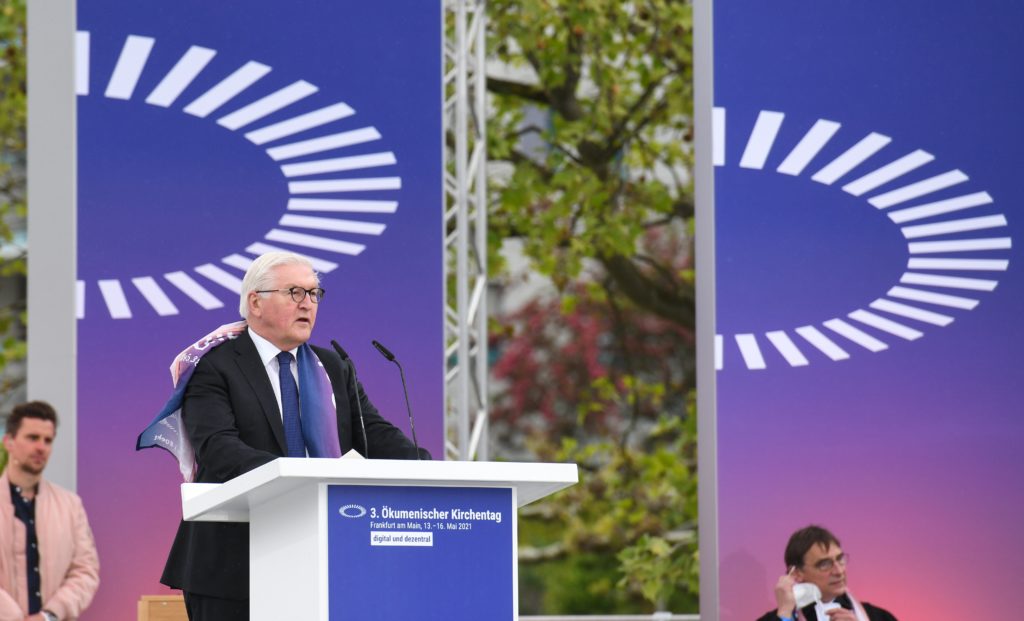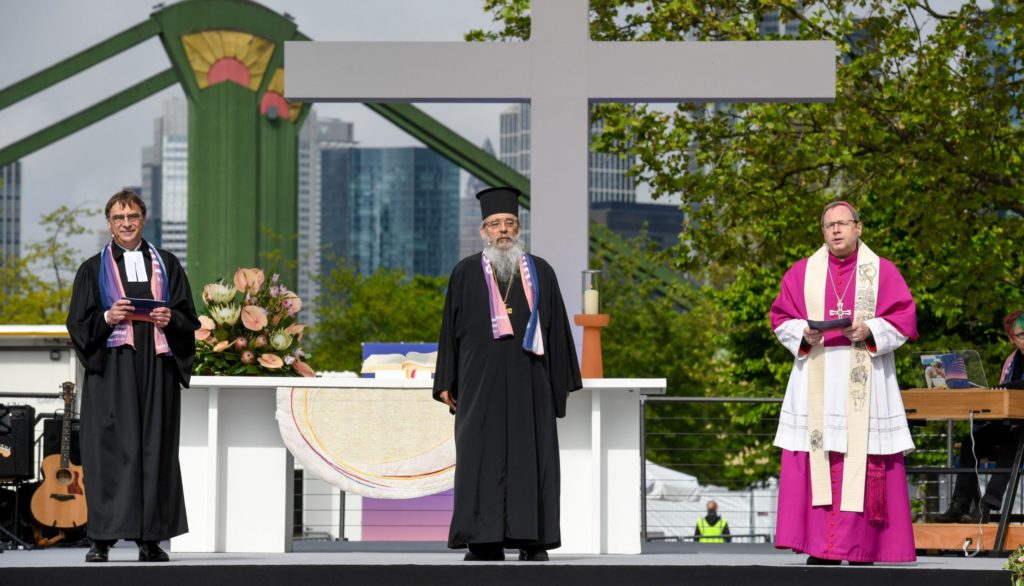 Blessing homosexual couples, perhaps only an "episode".
Blessing homosexual couples, perhaps only an "episode". Blessings to homosexual unions in Germany: who was interested?
Blessings to homosexual unions in Germany: who was interested? The German synodal journey enters a new phase
The German synodal journey enters a new phaseCatholic Congresses (Katholikentage) have a long tradition in Germany: they have been held since 1848, as a rule every two years. They were originally General Assemblies of lay associations, as a reaction to the oppression suffered by Catholics even then, which led to the so-called 'Kulturkampf' (culture war) conflict in the 1870s.
In addition to a demonstration of faith, with mass masses of people, round tables or panels with representatives of the Church and politics have become more and more widespread to discuss issues of social, cultural, political and ecclesiastical interest. On the Protestant side, the German Evangelical Congress - although with precedents both in the 19th century and after World War I - began to be organized in 1949. It is usually held alternately with the Catholic Congress.
The Third Ecumenical Congress
In 2003, the Central Committee of German Catholics - organizer of the Catholic Congress since 1970 - and the German Evangelical Congress held the first Ecumenical Congress in Berlin. In 2010, this assembly of Catholics and Protestants took place for the second time in Munich. Now, the third German Ecumenical Congress took place from May 13 to 16, this time in Frankfurt am Main (Frankfurt), but - due to restrictions concerning the COVID pandemic - without large-scale events and largely virtually.
In his invitation to the Assembly, Bishop Bätzing, President of the German Bishops' Conference and Bishop of Limburg, in whose territory Frankfurt is located, stated that "this is not just a meeting between Catholics and Protestants, but a sign of the brotherhood of all Christian confessions in our country: together we want to celebrate and bear witness to the faith. Together we want to express that we contribute to shaping the world and stand united in doing so. We stand for causes that concern the cohesion of society, social justice and global solidarity."
Merkel's participation
According to Alexander Kissler, editor of the Neue Zürcher Zeitung (NZZ), the Ecumenical Congress was dominated by ecological themes: "The congress addressed the nature of politics, the challenges posed by COVID and responses to climate change. It was ecumenical because it was organized by lay people from the two main Christian denominations, and ecclesial because Bible studies and church services framed the political discussion panels.
A special highlight was entitled "Why climate protection needs all generations", with the participation of Chancellor Angela Merkel and Luisa Neubauer, the young activist who leads Greta Thunberg's "Fridays for Future" movement in Germany. The panel was moderated by Congress chair Bettina Limperg. Merkel's appeal in view of the Bundestag general elections in September was somewhat perplexing, as she called for a vote for a party that prioritizes environmental protection: "I want those who work for climate protection, for sustainability, for biodiversity to win.
Even if he did not name the party itself, it escapes no one's notice that these are precisely the essential points of the program of the Greens, who - according to current polls on voting intention - are fighting a neck-and-neck battle with precisely Merkel's party, CDU, to be the first party (each with approximately 25 % voting intention).
Bätzing's positive balance
At the end of the Congress, Bishop Bätzing gave a positive assessment: "More than 80 activities - Bible studies, worship events, interviews and digital encounters - have developed an enormous outreach. Many people expected Christian churches to speak out on issues of importance for the future of people and society such as climate justice or the consequences of the pandemic worldwide; but we have also dealt with the crisis situation in the Church with sexual abuse and loss of trust."
In addition to the aforementioned NZZ, another well-known newspaper, the Frankfurter Allgemeine Zeitung, one of its editors, Carsten Knop, headlined his commentary: "Church Congress without the Holy Spirit", in which he said: "What will happen in the churches after the long break imposed by the pandemic? One of those present at the Congress mentioned a survey according to which, after COVID, only 60 % of those who used to attend church will return. To this, the Congress had no answer. We are on the eve of Pentecost, but this sign of a new beginning played no role. The poison against the Holy Spirit, however, is the desire to be self-sufficient, to take care of oneself. Here the participants digitally took care of themselves; they exchanged well-known theses on economics, climate protection and social policy. But, dear churches, modesty and arrogance are simply a lack of spirit.

About the Eucharist
Regina Einig, editor of the Catholic weekly "Die Tagespost", writes: "No one is in a position to say exactly who has taken an interest in the Congress. Not even the Catholic bishop responsible for ecumenical relations, Bishop Gerhard Feige, spoke of the significance of the event. The digital approach did not work: at the venue, people could be seen isolated in front of a screen, instead of praying together. Thus, the Ecumenical Congress was deprived of just its traditional distinguishing feature: images of full pavilions, with crowds singing and strolling in stark contrast to the half-empty church pews."
"For more than a year now, most Protestant communities have stopped holding face-to-face religious services, while Catholic Masses have experienced a marked decline in attendance. The celebration of the joint Eucharist planned for Saturday evening as an exhibition event did not have the expected effect, because the organizers made a miscalculation: what has become customary in many communities no longer means - from their point of view - a provocation; this is why the expected enthusiasm for the demonstrative invitation to the ecumenical Holy Communion was conspicuous by its absence, just where special forms have been imposed. For Christians who think in universal categories, the Ecumenical Congress was unacceptable. One is left with the impression that the organizers were overtaken on the left by the grassroots. If the effusive praise for the individual Holy Communion online is anything to go by, it seems that those who saw the Congress as a 'breakthrough' are lagging behind the mainstream in Germany."
Regarding this last question, the most thorny issue of the Ecumenical Congress, Bishop Bätzing wrote to the priests of his diocese a letter in which he stressed that "there can be neither a joint celebration of the Holy Mass by clergy of different confessions, nor a general reception of the Eucharist between confessions." However, he added, "in individual cases it will be tolerated". Bishop Bätzing continued: "So far, a general invitation of all the baptized to receive the Eucharist is not possible, because there is no full communion with the Church. In the Catholic Missal there is no form of invitation to non-Catholics to receive the Eucharist".
Various opinions
However, in four evangelical services Catholics were invited to participate in Holy Communion; the president of the Central Committee of German Catholics, Thomas Sternberg, did so, while the president of the Ecumenical Congress, the evangelical Bettina Limperg, came to receive communion at the Mass celebrated in the Catholic cathedral of Frankfurt. The president of the Council of the Evangelical Church in Germany (EKD), Bishop Heinrich Bedford-Strohm, participated in Orthodox vespers, but there was no Eucharistic celebration.
While Bishop Bätzing stressed that "we want to show a sign of unity in this way," the former Prefect of the Vatican Congregation for the Doctrine of the Faith, Cardinal Gerhard Ludwig Müller, called it "a provocation to the Magisterium of the Catholic Church," because for the Catholic and Orthodox magisterium, ecclesial communion and sacramental-Eucharistic communion are inseparably united. "This is not ecumenism, but a relativization of the Catholic faith," he concluded.











